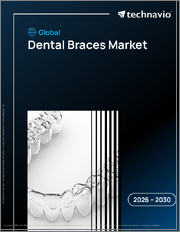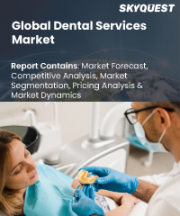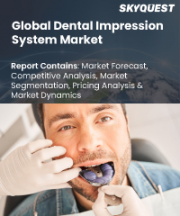
|
시장보고서
상품코드
1836365
치과교정용 헤드기어 시장 예측(-2032년) : 유형별, 재료 유형별, 용도별, 최종 사용자별, 지역별 세계 분석Orthodontic Headgear Market Forecasts to 2032 - Global Analysis By Type (Cervical-Pull Headgear, High-Pull Headgear, Reverse-Pull, and Other Types), Material Type, Application, End User and By Geography |
||||||
Stratistics MRC에 따르면 세계의 치과교정용 헤드기어 시장은 2025년 12억 2,000만 달러를 차지하고 예측 기간 동안 CAGR 7.1%를 나타내 2032년에는 19억 7,000만 달러에 이를 것으로 예상되고 있습니다.
치과교정용 헤드기어는 물린 교란과 턱 정렬 문제를 해결하기 위해 고안된 치과 전문 장비입니다. 치아와 턱의 구조에 제어된 외압을 가하여 최적의 결과를 얻기 위해 치열 교정을 보완합니다. 이 장치는 일반적으로 머리 또는 경부에 장착되는 스트랩 또는 프레임워크를 포함하며 구강 교정 장치에 연결됩니다. 성장기 환자에게 잘 처방되는 헤드기어는 턱의 개발을 이끌고, 치열의 악화를 방지하고, 종합적인 교정을 지원합니다.
MDPI가 발표한 연구에 의하면, 취학 전 아동의 부정교합율은 세계 전체에서 28.4%-83.9%로 폭넓게, 그 절반 이상이 50%를 넘고 있습니다.
부정 교합과 치과 질환의 유병률 증가
치아의 부정 교합과 턱의 부조화의 이환율 증가는 치과교정용 헤드기어 수요를 촉진하고 있습니다. 구강의 건강에 대한 의식이 높아짐에 따라, 기능적·심미적인 우려를 위해 교정 치료를 요구하는 사람이 증가하고 있습니다. 영상 진단과 3D 치과 매핑의 진보로 조기 발견과 개인에 맞는 치료 계획이 가능해지고 있습니다. 소아와 성인 모두 치열 교정의 급증에 기여합니다. 신흥 시장에서는 치과 치료에 대한 접근성이 증가하고 환자층이 더욱 확대되고 있습니다. 이 동향은 헤드기어 디자인과 디지털 교정 플랫폼과의 통합에 있어서의 기술 혁신을 가속화하고 있습니다.
환자 불편함과 컴플라이언스 문제
많은 사용자가 장시간 착용, 사회적 낙인, 수면 방해 등의 과제를 보고하고 치료의 어드히어런스에 영향을 미치고 있습니다. 제조업체는 편안함과 사용 편의성을 향상시키기 위해 인체 공학적 디자인과 경량 소재를 모색하고 있습니다. 장착 시간 추적 및 경보를 갖춘 스마트 헤드기어 시스템도 컴플라이언스 향상을 위해 개발되었습니다. 그러나 사용자 정의 및 디지털 모니터링은 규제 당국의 승인과 비용 구조를 복잡하게 만듭니다. 이러한 제한은 특히 치과교정 인프라가 제한된 지역에서 시장 침투를 지연시킬 수 있습니다.
맞춤형 미적 헤드기어에 대한 수요 증가
개별 교정 치료로의 전환은 개인의 선호와 라이프 스타일의 요구에 따라 헤드기어에 대한 관심을 높입니다. 환자는 일상 생활에 녹는 눈에 띄지 않고 세련되고 편안한 솔루션을 찾고 있습니다. 3D 프린팅과 CAD/CAM 기술의 혁신에 의해 피트감과 외형의 아름다움을 향상시킨 주문제작의 헤드기어가 가능하게 되었습니다. 컬러 옵션, 투명한 구성 요소, 최소한의 디자인 등 심미적인 강화가 인기를 끌고 있습니다. 진행 상황 추적 및 가상 진단을 위한 모바일 앱과의 통합은 환자와의 참여도를 높이고 있습니다. 이러한 진화는 프리미엄 제품 라인과 틈새 시장 부문에 새로운 길을 열고 있습니다.
클리어 얼라이너나 보이지 않는 교정 장치와의 경쟁
클리어 얼라이너와 보이지 않는 교정 장치의 급속한 보급은 기존의 헤드기어 시스템에 큰 위협을 초래합니다. 이러한 대안은 특히 경도에서 중등도의 불법 교합에 대해 더 높은 편안함, 미적 매력 및 편리성을 제공합니다. 기술 주도 브랜드는 AI 기반 치료 계획과 소비자 직접 판매 모델을 활용하여 기존의 교정 치과를 파괴하고 있습니다. 헤드기어 제조업체는 눈에 보이지 않는 솔루션으로 전환하는 시장에서 혁신적이지 않으면 관련성을 잃는 압력에 직면하고 있습니다. 디지털 치열 교정 플랫폼과의 전략적 제휴는 이러한 위협을 완화하는 데 도움이 될 수 있습니다. 그러나 큰 차별화가 없다면, 헤드기어 제품은 이미지에 민감한 청소년 소비자의 유지에 고전할 수 있습니다.
COVID-19의 영향 :
팬데믹은 치열 교정 치료에 큰 지장을 주었고, 긴급성이 없는 치료를 늦추고 환자의 방문을 감소시켰습니다. 잠금 및 공급 체인 중단으로 인해 치열 교정 부품 및 재료가 부족했습니다. 그러나 이 위기는 원격 치과교정과 원격 모니터링 기술의 채택을 가속화했습니다. 치료의 연속성을 유지하기 위해, 치료원은 가상 진찰과 AI를 활용한 치료 시뮬레이션의 도입을 시작했습니다. 규제 기관은 디지털 교정 도구의 신속한 승인을 도입하고 혁신을 뒷받침했습니다. Covid 후의 전략은 탄력성, 분산형 치료 모델, 대면식과 원격식을 결합한 하이브리드 치료 접근법에 중점을 둡니다.
예측 기간 동안 경추 풀 헤드기어 부문이 최대가 될 전망
경추 풀헤드기어 분야는 2급 부정교합 치료에 효과적이기 때문에 예측 기간 동안 최대 시장 점유율을 차지할 것으로 예측됩니다. 그 설계는 어금니의 원위 이동을 제어 할 수 있기 때문에 치과교정 의사 사이에서 선호됩니다. 최근의 동향에는 정밀도를 높이기 위한 감압 모듈과 조정 가능한 힘 시스템이 포함됩니다. 이 분야는 임상적으로 널리 채택되며 다양한 브래킷 시스템과 호환되는 것이 장점입니다. 치료 제조업체는 또한 환자의 편안함을 개선하고 치료 시간을 단축하는 모듈 디자인을 도입했습니다. 신뢰성이 높고 비용 효율적인 솔루션에 대한 수요가 증가함에 따라 경추 견인 헤드기어는 사용량과 혁신성을 지속적으로 이끌고 있습니다.
치열교정센터 분야는 예측기간 중 가장 높은 CAGR을 나타낼 것으로 예상됩니다.
예측 기간 동안 치과교정 센터 분야는 전문성과 고급 치료 능력으로 인해 가장 높은 성장률을 보일 것으로 예측됩니다. 이러한 시설은 디지털 이미지, AI 기반 치료 계획, 로봇 지원 조정 도구를 갖추고 있습니다. 환자는 전문성, 대기 시간 단축 및 개인화된 치료를 위해 전용 센터를 선호합니다. 클라우드 기반 환자 기록과 원격 모니터링의 통합은 업무 효율성을 높입니다. 새로운 동향으로는 종합적 치료를 위한 정액제 교정치과 플랜과 번들 서비스를 들 수 있습니다. 전문적인 치열 교정 서비스에 대한 수요가 증가함에 따라 이러한 센터는 시장 확대의 중심적 존재가 되고 있습니다.
최대 점유율을 차지하는 지역
예측 기간 동안 아시아태평양은 치과 의료 인프라의 확대와 중류 계급의 인구 증가로 최대 시장 점유율을 차지할 것으로 예측됩니다. 중국, 인도, 한국과 같은 국가들은 치과교정 클리닉과 교육 프로그램에 많은 투자를 하고 있습니다. 구강 위생 의식 향상과 치료비 보조를 촉진하는 정부의 대처가 수요를 밀어 올리고 있습니다. 이 지역은 또한 디지털 치열 교정 기술과 모바일 건강 플랫폼의 급속한 보급을 목격하고 있습니다. 현지 제조업체는 지역 요구에 맞는 비용 효율적인 헤드기어 솔루션을 시장에 출시합니다. 세계 기업과의 전략적 파트너십은 아시아태평양 전역에서 기술 혁신과 유통 능력을 강화하고 있습니다.
가장 높은 CAGR을 나타내는 지역 :
예측 기간 동안 북미가 가장 높은 CAGR을 나타낼 것으로 예측되며, 그 원동력은 기술적 리더십과 견고한 건강 관리 생태계입니다. 미국과 캐나다는 스마트 치열 교정 장치, AI 주도형 진단, 웨어러블 컴플라이언스 트래커를 개척하고 있습니다. 규제 기관은 차세대 헤드기어 시스템의 승인을 간소화하고 더 빠른 시장 진입을 촉구합니다. 치열 교정 치료는 IoT 지원 도구와 클라우드 기반 치료 플랫폼을 통합하여 워크플로를 최적화합니다. 이 지역은 높은 보험 적용률과 미용 치과 솔루션에 대한 소비자의 투자 의지로부터 혜택을 누리고 있습니다.
사용자 정의 무료 제공 :
이 보고서를 구독하는 고객은 다음 무료 맞춤설정 옵션 중 하나를 사용할 수 있습니다.
- 기업 프로파일
- 추가 시장 기업의 종합적 프로파일링(3개사까지)
- 주요 기업의 SWOT 분석(3개사까지)
- 지역 세분화
- 고객의 관심에 응한 주요국 시장 추계·예측·CAGR(주 : 타당성 확인에 따름)
- 경쟁 벤치마킹
- 제품 포트폴리오, 지리적 존재, 전략적 제휴에 기반한 주요 기업 벤치마킹
목차
제1장 주요 요약
제2장 서문
- 개요
- 이해관계자
- 조사 범위
- 조사 방법
- 데이터 마이닝
- 데이터 분석
- 데이터 검증
- 조사 접근
- 조사 자료
- 1차 조사 자료
- 2차 조사 정보원
- 전제조건
제3장 시장 동향 분석
- 성장 촉진요인
- 성장 억제요인
- 기회
- 위협
- 용도 분석
- 최종 사용자 분석
- 신흥 시장
- COVID-19의 영향
제4장 Porter's Five Forces 분석
- 공급기업의 협상력
- 구매자의 협상력
- 대체품의 위협
- 신규 참가업체의 위협
- 경쟁 기업 간 경쟁 관계
제5장 세계의 치과교정용 헤드기어 시장 : 유형별
- 경추 견인 헤드기어
- 고견인 헤드기어
- 역방향 견인
- 기타 유형
제6장 세계의 치과교정용 헤드기어 시장 : 재료 유형별
- 스테인레스 스틸
- 플라스틱/폴리머
- 기타 재료 유형
제7장 세계의 치과교정용 헤드기어 시장 : 용도별
- 과교합
- 연령층 11-20세
- 연령층 21-25세
- 연령층 26-30세
- 전치부 돌출
- 기타 정렬 장애
- 하악 전돌
- 교합 이상
제8장 세계의 치과교정용 헤드기어 시장 : 최종 사용자별
- 병원 및 클리닉
- 교정 센터
- 치과 학술 기관
- 기타 최종 사용자
제11장 세계의 치과교정용 헤드기어 시장 : 지역별
- 북미
- 미국
- 캐나다
- 멕시코
- 유럽
- 독일
- 영국
- 이탈리아
- 프랑스
- 스페인
- 기타 유럽
- 아시아태평양
- 일본
- 중국
- 인도
- 호주
- 뉴질랜드
- 한국
- 기타 아시아태평양
- 남미
- 아르헨티나
- 브라질
- 칠레
- 기타 남미
- 중동 및 아프리카
- 사우디아라비아
- 아랍에미리트(UAE)
- 카타르
- 남아프리카
- 기타 중동 및 아프리카
제12장 주요 발전
- 계약, 파트너십, 협업, 합작투자
- 인수와 합병
- 신제품 발매
- 사업 확대
- 기타 주요 전략
제13장 기업 프로파일링
- 3M Company
- Ormco Corporation
- Adenta GmbH
- TP Orthodontics, Inc.
- American Orthodontics
- Rocky Mountain Orthodontics
- DB Orthodontics
- Plaza Orthodontics
- Dentaurum Inc.
- Ortho Kinetics Corporation
- Dentsply Sirona
- Henry Schein, Inc.
- Great Lakes Dental Technologies
- G&H Orthodontics
- Protec Dental Laboratories
According to Stratistics MRC, the Global Orthodontic Headgear Market is accounted for $1.22 billion in 2025 and is expected to reach $1.97 billion by 2032 growing at a CAGR of 7.1% during the forecast period. Orthodontic headgear is a specialized device in dentistry designed to address bite irregularities and jaw alignment issues. By exerting controlled external pressure on teeth and jaw structures, it complements braces in achieving optimal results. The appliance generally includes straps or a framework placed around the head or neck, connected to intraoral orthodontic equipment. Commonly prescribed for growing patients, headgear assists in guiding jaw development, preventing worsening misalignment, and supporting comprehensive orthodontic correction.
According to a study published by MDPI, malocclusion rates among preschool children globally range widely, from 28.4% to 83.9%, with over half of these rates exceeding 50%.
Market Dynamics:
Driver:
Increasing prevalence of malocclusion and dental disorders
The growing incidence of dental misalignments and jaw irregularities is fueling demand for orthodontic headgear solutions. As awareness of oral health rises, more individuals are seeking corrective treatments for functional and aesthetic concerns. Advancements in diagnostic imaging and 3D dental mapping are enabling earlier detection and personalized treatment planning. Both pediatric and adult populations are contributing to the surge in orthodontic interventions. Emerging markets are witnessing increased access to dental care, further expanding the patient pool. This trend is accelerating innovation in headgear design and integration with digital orthodontic platforms.
Restraint:
Patient discomfort and compliance issues
Many users report challenges with prolonged wear, social stigma, and sleep disruption, affecting treatment adherence. Manufacturers are exploring ergonomic designs and lightweight materials to enhance comfort and usability. Smart headgear systems with wear-time tracking and alerts are being developed to improve compliance. However, customization and digital monitoring add complexity to regulatory approvals and cost structures. These limitations may slow down market penetration, especially in regions with limited orthodontic infrastructure.
Opportunity:
Rising demand for customized and aesthetic headgear
The shift toward personalized orthodontic care is driving interest in headgear that aligns with individual preferences and lifestyle needs. Patients increasingly seek discreet, stylish, and comfortable solutions that blend with daily routines. Innovations in 3D printing and CAD/CAM technologies are enabling tailor-made headgear with improved fit and visual appeal. Aesthetic enhancements such as color options, transparent components, and minimalistic designs are gaining traction. Integration with mobile apps for progress tracking and virtual consultations is also enhancing patient engagement. This evolution is opening new avenues for premium product lines and niche market segments.
Threat:
Competition from clear aligners and invisible braces
The rapid adoption of clear aligners and invisible braces poses a major threat to traditional headgear systems. These alternatives offer greater comfort, aesthetic appeal, and convenience, especially for mild to moderate malocclusions. Tech-driven brands are leveraging AI-based treatment planning and direct-to-consumer models to disrupt conventional orthodontics. Headgear manufacturers face pressure to innovate or risk losing relevance in a market shifting toward invisible solutions. Strategic collaborations with digital orthodontic platforms may help mitigate this threat. However, without significant differentiation, headgear products may struggle to retain younger, image-conscious consumers.
Covid-19 Impact:
The pandemic significantly disrupted orthodontic care, delaying non-urgent treatments and reducing patient visits. Lockdowns and supply chain interruptions led to shortages in orthodontic components and materials. However, the crisis accelerated the adoption of tele-orthodontics and remote monitoring technologies. Clinics began integrating virtual consultations and AI-driven treatment simulations to maintain continuity of care. Regulatory bodies introduced fast-track approvals for digital orthodontic tools, boosting innovation. Post-Covid strategies now emphasize resilience, decentralized care models, and hybrid treatment approaches combining in-person and remote modalities.
The cervical-pull headgear segment is expected to be the largest during the forecast period
The cervical-pull headgear segment is expected to account for the largest market share during the forecast period, due to its effectiveness in treating Class II malocclusions. Its design allows for controlled distal movement of molars, making it a preferred choice among orthodontists. Recent developments include pressure-sensitive modules and adjustable force systems for enhanced precision. The segment benefits from widespread clinical adoption and compatibility with various bracket systems. Manufacturers are also introducing modular designs that improve patient comfort and reduce treatment time. As demand for reliable and cost-effective solutions grows, cervical-pull headgear continues to lead in usage and innovation.
The orthodontic centers segment is expected to have the highest CAGR during the forecast period
Over the forecast period, the orthodontic centers segment is predicted to witness the highest growth rate, driven by their specialization and advanced treatment capabilities. These facilities are increasingly equipped with digital imaging, AI-based treatment planning, and robotic-assisted adjustment tools. Patients prefer dedicated centers for their expertise, shorter wait times, and personalized care. Integration of cloud-based patient records and remote monitoring is enhancing operational efficiency. Emerging trends include subscription-based orthodontic plans and bundled services for comprehensive care. As demand for specialized orthodontic services rises, these centers are becoming central to market expansion.
Region with largest share:
During the forecast period, the Asia Pacific region is expected to hold the largest market share, due to its expanding dental care infrastructure and growing middle-class population. Countries like China, India, and South Korea are investing heavily in orthodontic clinics and training programs. Government initiatives promoting oral health awareness and subsidized treatments are boosting demand. The region is also witnessing rapid adoption of digital orthodontic technologies and mobile health platforms. Local manufacturers are entering the market with cost-effective headgear solutions tailored to regional needs. Strategic partnerships with global players are enhancing innovation and distribution capabilities across Asia Pacific.
Region with highest CAGR:
Over the forecast period, the North America region is anticipated to exhibit the highest CAGR, fueled by its technological leadership and robust healthcare ecosystem. The U.S. and Canada are pioneering smart orthodontic devices, AI-driven diagnostics, and wearable compliance trackers. Regulatory agencies are streamlining approvals for next-gen headgear systems, encouraging faster market entry. Orthodontic practices are integrating IoT-enabled tools and cloud-based treatment platforms to optimize workflows. The region benefits from high insurance coverage and consumer willingness to invest in aesthetic dental solutions.
Key players in the market
Some of the key players in Orthodontic Headgear Market include 3M Company, Ormco Corporation, Adenta GmbH, TP Orthodontics, Inc., American Orthodontics, Rocky Mountain Orthodontics, DB Orthodontics, Plaza Orthodontics, Dentaurum Inc., Ortho Kinetics Corporation, Dentsply Sirona, Henry Schein, Inc., Great Lakes Dental Technologies, G&H Orthodontics, and Protec Dental Laboratories.
Key Developments:
In December 2024, 3M and US Conec Ltd. announced a strategic licensing agreement for 3M(TM) Expanded Beam Optical Interconnect technology, a solution to meet the performance and scalability needs of next-generation data centers and advanced network architectures. The collaboration combines advanced optical technology from 3M with US Conec's expertise in high-density connectivity systems, expanded beam optics, and precision manufacturing to help deliver innovative solutions tailored to the evolving demands of modern networks.
In June 2022, Spark(TM) Clear Aligners announced in partnership with internationally famous member of K-Pop band Got7, singer, songwriter, gamer, and model, Mark Tuan, will be "Gifting Smiles" to five of his fans. Starting June 15th, 2022, the contest offers teens and adults the chance to win orthodontic treatment in conjunction with Spark Aligners "My True Smile" campaign. The campaign breaks away from convention by partnering with celebrities who have demonstrated vulnerability and inner strength that inspires their fans.
Types Covered:
- Cervical-Pull Headgear
- High-Pull Headgear
- Reverse-Pull
- Other Types
Material Types Covered:
- Stainless Steel
- Plastic/Polymer
- Other Materials
Applications Covered:
- Overbite
- Overjet
- Other Alignment Disorders
End Users Covered:
- Hospitals & Clinics
- Orthodontic Centers
- Dental Academic Institutes
- Other End Users
Regions Covered:
- North America
- US
- Canada
- Mexico
- Europe
- Germany
- UK
- Italy
- France
- Spain
- Rest of Europe
- Asia Pacific
- Japan
- China
- India
- Australia
- New Zealand
- South Korea
- Rest of Asia Pacific
- South America
- Argentina
- Brazil
- Chile
- Rest of South America
- Middle East & Africa
- Saudi Arabia
- UAE
- Qatar
- South Africa
- Rest of Middle East & Africa
What our report offers:
- Market share assessments for the regional and country-level segments
- Strategic recommendations for the new entrants
- Covers Market data for the years 2024, 2025, 2026, 2028, and 2032
- Market Trends (Drivers, Constraints, Opportunities, Threats, Challenges, Investment Opportunities, and recommendations)
- Strategic recommendations in key business segments based on the market estimations
- Competitive landscaping mapping the key common trends
- Company profiling with detailed strategies, financials, and recent developments
- Supply chain trends mapping the latest technological advancements
Free Customization Offerings:
All the customers of this report will be entitled to receive one of the following free customization options:
- Company Profiling
- Comprehensive profiling of additional market players (up to 3)
- SWOT Analysis of key players (up to 3)
- Regional Segmentation
- Market estimations, Forecasts and CAGR of any prominent country as per the client's interest (Note: Depends on feasibility check)
- Competitive Benchmarking
- Benchmarking of key players based on product portfolio, geographical presence, and strategic alliances
Table of Contents
1 Executive Summary
2 Preface
- 2.1 Abstract
- 2.2 Stake Holders
- 2.3 Research Scope
- 2.4 Research Methodology
- 2.4.1 Data Mining
- 2.4.2 Data Analysis
- 2.4.3 Data Validation
- 2.4.4 Research Approach
- 2.5 Research Sources
- 2.5.1 Primary Research Sources
- 2.5.2 Secondary Research Sources
- 2.5.3 Assumptions
3 Market Trend Analysis
- 3.1 Introduction
- 3.2 Drivers
- 3.3 Restraints
- 3.4 Opportunities
- 3.5 Threats
- 3.6 Application Analysis
- 3.7 End User Analysis
- 3.8 Emerging Markets
- 3.9 Impact of Covid-19
4 Porters Five Force Analysis
- 4.1 Bargaining power of suppliers
- 4.2 Bargaining power of buyers
- 4.3 Threat of substitutes
- 4.4 Threat of new entrants
- 4.5 Competitive rivalry
5 Global Orthodontic Headgear Market, By Type
- 5.1 Introduction
- 5.2 Cervical-Pull Headgear
- 5.3 High-Pull Headgear
- 5.4 Reverse-Pull
- 5.5 Other Types
6 Global Orthodontic Headgear Market, By Material Type
- 6.1 Introduction
- 6.2 Stainless Steel
- 6.3 Plastic/Polymer
- 6.4 Other Materials
7 Global Orthodontic Headgear Market, By Application
- 7.1 Introduction
- 7.2 Overbite
- 7.2.1 Age Group 11-20
- 7.2.2 Age Group 21-25
- 7.2.3 Age Group 26-30
- 7.3 Overjet
- 7.4 Other Alignment Disorders
- 7.4.1 Underbite
- 7.4.2 Crossbite
8 Global Orthodontic Headgear Market, By End User
- 8.1 Introduction
- 8.2 Hospitals & Clinics
- 8.3 Orthodontic Centers
- 8.4 Dental Academic Institutes
- 8.5 Other End Users
11 Global Orthodontic Headgear Market, By Geography
- 11.1 Introduction
- 11.2 North America
- 11.2.1 US
- 11.2.2 Canada
- 11.2.3 Mexico
- 11.3 Europe
- 11.3.1 Germany
- 11.3.2 UK
- 11.3.3 Italy
- 11.3.4 France
- 11.3.5 Spain
- 11.3.6 Rest of Europe
- 11.4 Asia Pacific
- 11.4.1 Japan
- 11.4.2 China
- 11.4.3 India
- 11.4.4 Australia
- 11.4.5 New Zealand
- 11.4.6 South Korea
- 11.4.7 Rest of Asia Pacific
- 11.5 South America
- 11.5.1 Argentina
- 11.5.2 Brazil
- 11.5.3 Chile
- 11.5.4 Rest of South America
- 11.6 Middle East & Africa
- 11.6.1 Saudi Arabia
- 11.6.2 UAE
- 11.6.3 Qatar
- 11.6.4 South Africa
- 11.6.5 Rest of Middle East & Africa
12 Key Developments
- 12.1 Agreements, Partnerships, Collaborations and Joint Ventures
- 12.2 Acquisitions & Mergers
- 12.3 New Product Launch
- 12.4 Expansions
- 12.5 Other Key Strategies
13 Company Profiling
- 13.1 3M Company
- 13.2 Ormco Corporation
- 13.3 Adenta GmbH
- 13.4 TP Orthodontics, Inc.
- 13.5 American Orthodontics
- 13.6 Rocky Mountain Orthodontics
- 13.7 DB Orthodontics
- 13.8 Plaza Orthodontics
- 13.9 Dentaurum Inc.
- 13.10 Ortho Kinetics Corporation
- 13.11 Dentsply Sirona
- 13.12 Henry Schein, Inc.
- 13.13 Great Lakes Dental Technologies
- 13.14 G&H Orthodontics
- 13.15 Protec Dental Laboratories



















